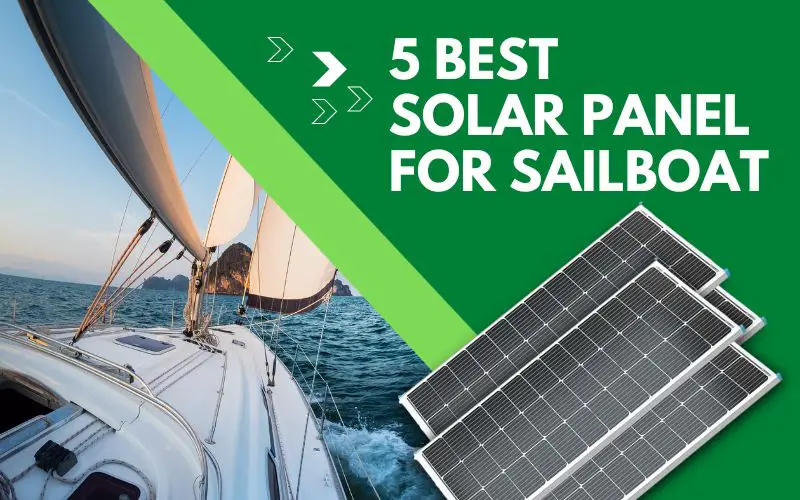You have a great many choices for energy in a sailboat – a diesel-powered generator, wind generator, solar panels, or hydro-generator. Or else, you can store enough energy in a battery by plugging it into the grid at the marina.
However, if you are planning on a long trip, many of these options won’t ensure enough electricity to last the entire trip. A diesel-powered generator is noisy and causes air pollution. The wind generator and hydro-generator are eco-friendly, but there is no guarantee that they can meet your energy demand.
This leaves us with solar panels for boats. As long as the sun is shining, solar panels will continue to generate electricity for your needs. This makes the solar-powered boat a reliable choice.
How to find the best solar panel for sailboat? Before you go shopping for solar panels for boats, you need to have a better understanding of your requirements and what is on offer. With the prices of solar panels coming down drastically in the last decade and the lucrative federal tax credit for its installation, the popularity of solar panels has soared. This has led to the flooding of the market with solar panels of all kinds.
Though choices are more now than ever, you need to be aware that not all the solar panels available in the market are of the same quality. They vary vastly in their efficiencies, longevity, warranty, and more.
This article attempts to simplify the process of choosing top-notch solar panels for boats. Here you will find a list of the best solar panel for sailboat, together with a buying guide to help you decide which one is best for you.
Please note that the links to Amazon products on this website are affiliate links, which means We may earn a small commission if you make a purchase through them. This comes at no additional cost to you and helps support the maintenance of this website.
Top 5 Solar Panel for Sailboat
Take a quick recommendation by checking out our product list or scroll down for detailed reviews.

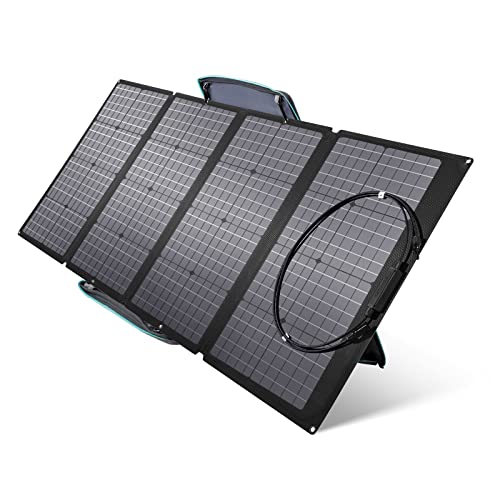



Most efficient solar panels for boats
1Renogy Monocrystalline Solar Panels 100 Watt (2Pcs)
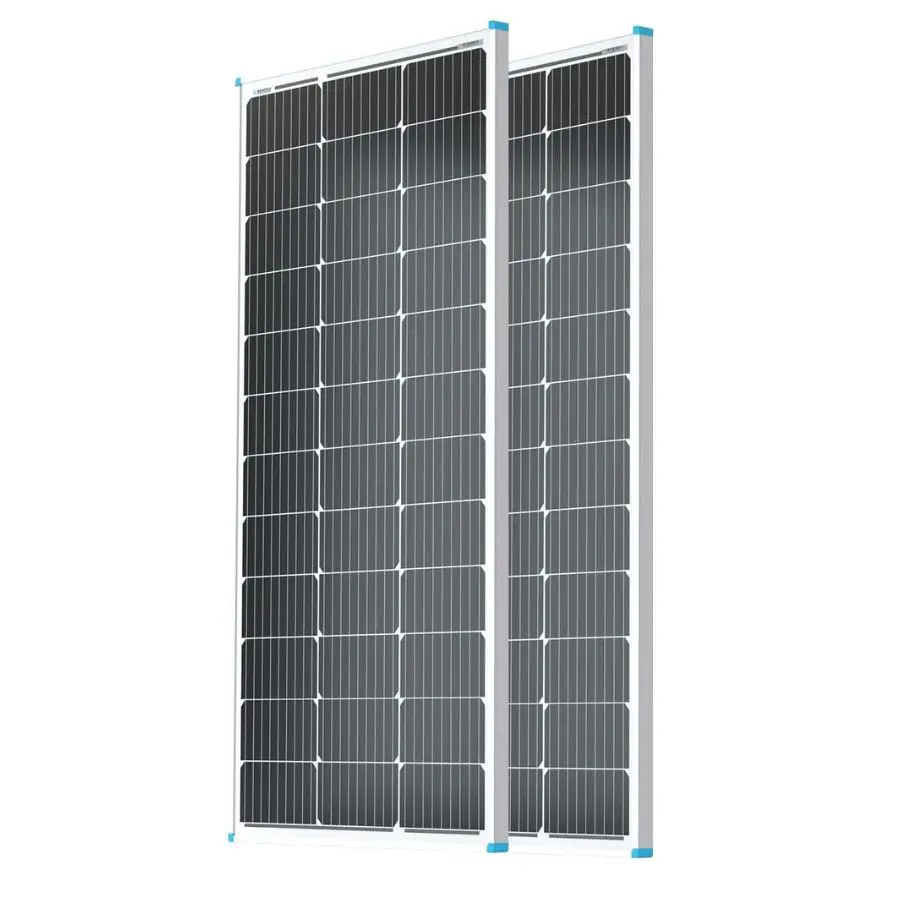
Specifications:
- Type of solar cell: Monocrystalline solar panel
- Wattage: 100W – 2Pcs
- Voltage: 12V
- Weight: 14.1 lbs
- Dimensions: 41.8 x 20.9 x 1.4 in
- Efficiency: 17.8%
- Warranty: 5-year material and workmanship warranty and a 25-year 80% output warranty
With a maximum output of 500Wh of electricity per day, these 100W monocrystalline solar panels from Renogy are perfect additions to a solar-powered boat. Its compact cell arrangement makes it one of the lightest and smallest solar panels for boats on the market. The solar cells are 100% EL-tested Grade A+ and equipped with PERC technology for higher efficiency.
Corrosion-resistant aluminum frames, low iron-tempered glass, and IP65 waterproofing make sure that these solar panels can survive intact in severe weather conditions. The bypass diodes prevent damage from overheating.
Pros:
- High-efficiency PERC monocrystalline solar panel
- Waterproof and weather-resistant
- Lightweight and reliable
Cons:
- Compatible only with Renogy mounts and brackets
2EF ECOFLOW Portable Solar Panel for Power Station160 W
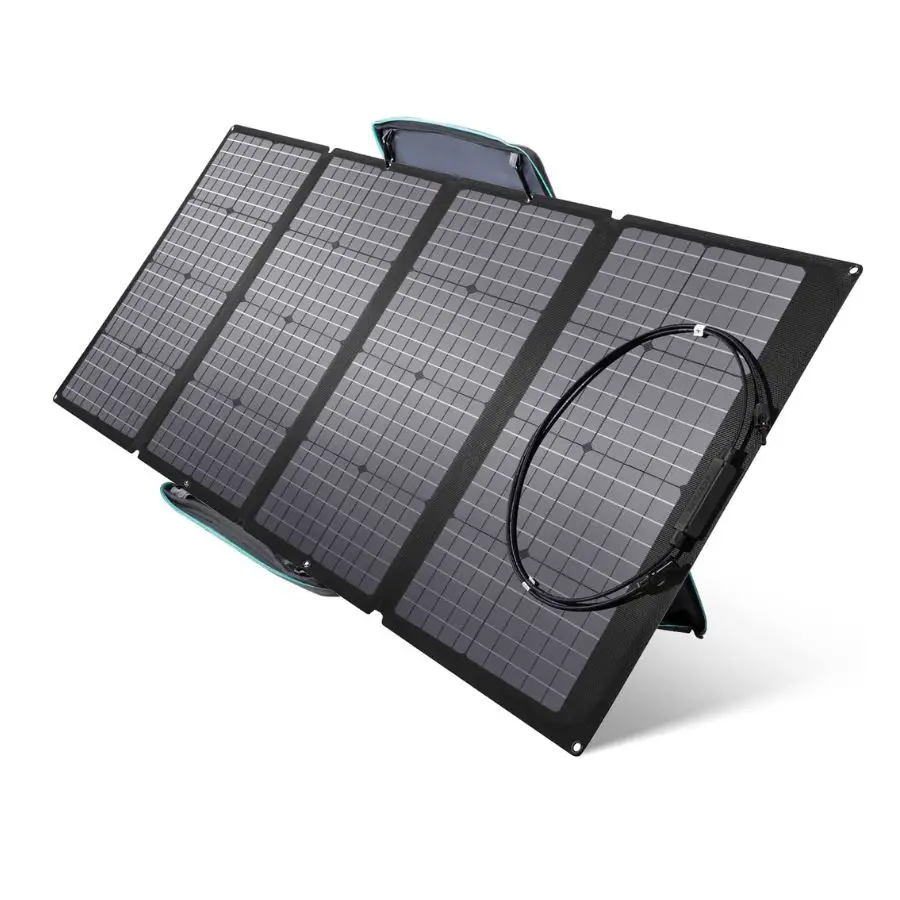
Specifications:
- Type of solar cell: Monocrystalline solar panel
- Wattage: 160W
- Voltage: Open circuit voltage of 21.4V (Vmp 18.2V)
- Weight: 15.43 lbs
- Dimensions: 26.8 x 16.5 x 1 in
- Efficiency: 21-22%
- Warranty: 12 months
This foldable and portable panel is perfect for a solar-powered boat. When connected to EcoFlow Power Station, these panels can meet your energy needs throughout the day. Not designed just for use in a solar-powered boat, these solar panels are ideal for any kind of outdoor activity like hiking and camping.
The kickstand case provided in the kit will help in keeping the panels safe while being transported. The ETFE film and IP68 waterproofing provide longevity to the panels. When connected to EcoFlow Power Station, you can avail the advantage of the MPPT charge controller for superior performance even in challenging weather conditions.
Pros:
- Foldable and portable
- Comes with all accessories to connect with EcoFlow Power Station
- Ideal for various outdoor activities
Cons:
- Suitable only with EcoFlow Power Station
3Topsolar Monocrystalline Solar Panel Kit 20W
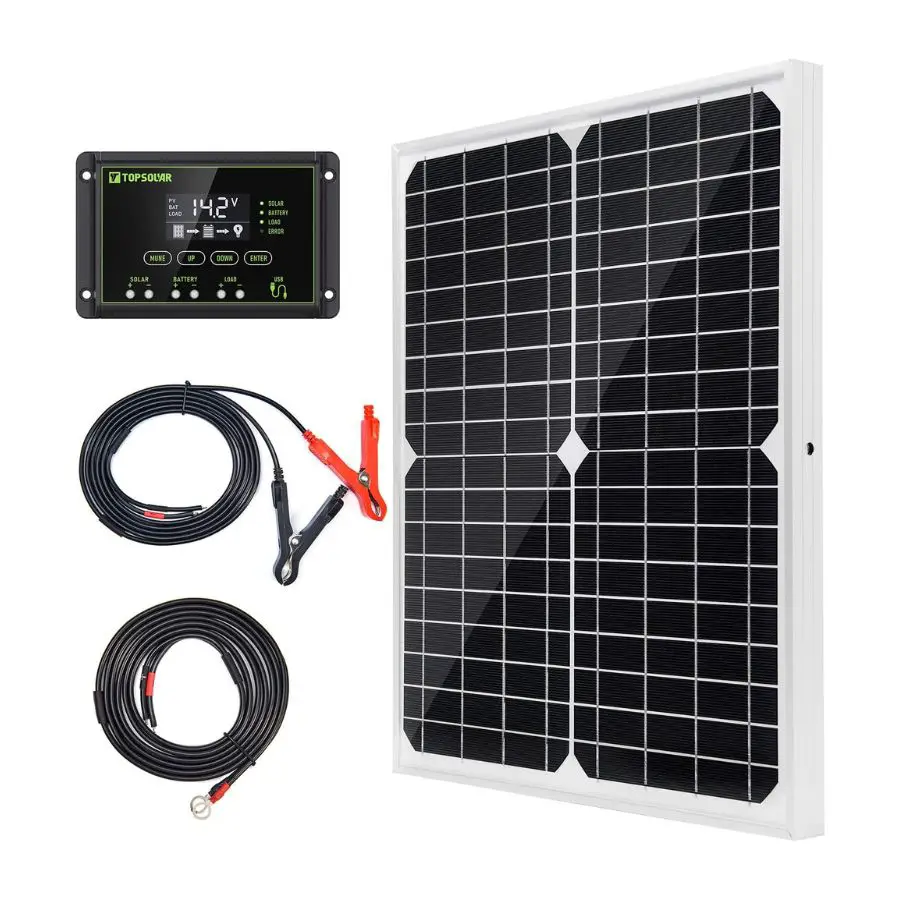
Specifications:
- Type of solar cell: Monocrystalline solar panel
- Wattage: 20W
- Voltage: 12V
- Weight: 4.8 lbs
- Dimensions: 18.9 x 13.4 x 0.7 in
- Warranty: 12 months
This is an all-in-one solar kit with a 20W solar panel, a 10A 12V/24V charge controller, and two 6.5-foot cables with alligator clips and an O-ring terminal for battery charging. The charge controller is well-equipped to prevent overcharge, over-voltage, discharge, and short circuits and comes with reversed polarity protection to keep the battery safe from damage.
Pre-drilled holes make it easier to mount and install on a solar-powered boat. Its compact size and lightweight are advantageous when the space is limited. The aluminum frame and strong tempered glass help it weather all conditions. The 12-month warranty is a good incentive to buy this solar panel kit.
Pros:
- Easy to install and carry
- Complete solar kit
- Weather-resistant construction
Cons:
- Can charge only small devices and appliances
4ECO-WORTHY Solar Car Battery Charger Maintainer 10W
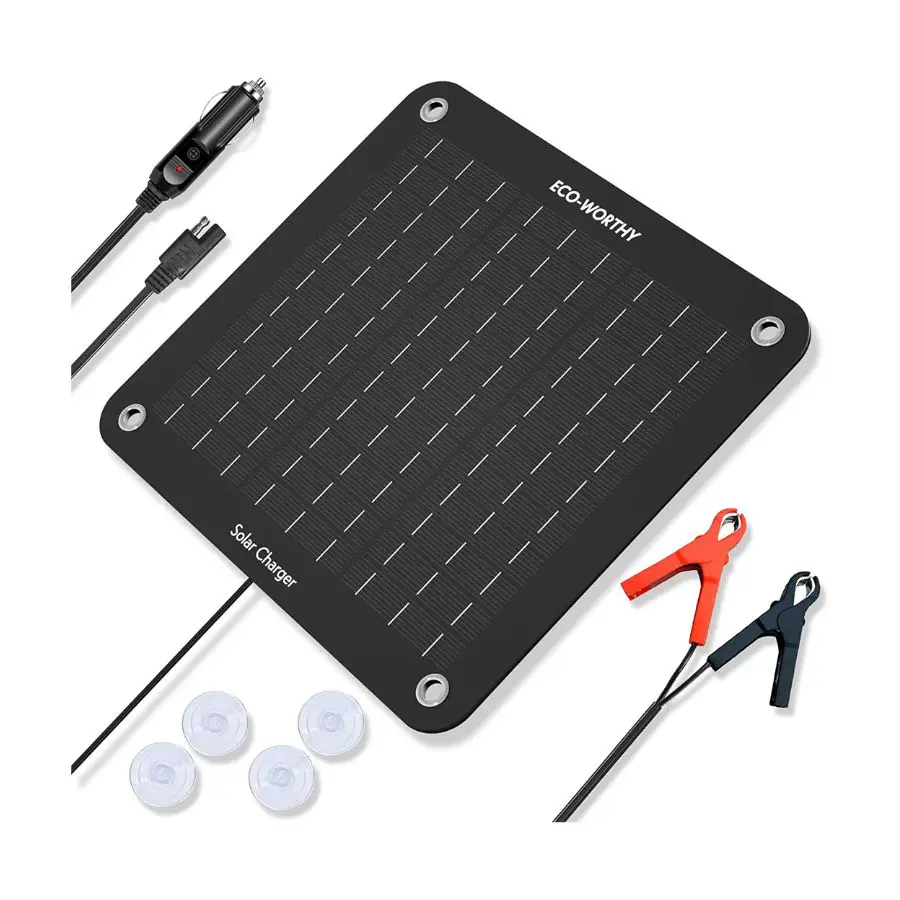
Specifications:
- Type of solar cell: Monocrystalline solar panel
- Wattage: 10W
- Voltage: 12V
- Weight: 0.71 lbs
- Dimensions: 1.4 x 9.6 x 15.3 in
- Warranty: 1 year
This solar battery charge maintainer can keep your solar-powered boat battery recharged and ready to go. These solar panels for boats also offer you the extra benefit of a cigarette lighter socket to draw power for emergency needs. This solar kit comes with a cable with alligator clips and another with a cigarette lighter adapter.
These solar panels for boats come with four pre-drilled holes and four suction cups for easy installation on windshields. This solar panel uses trickle charging to charge the battery, avoiding the mishap of overcharging. It also comes with built-in blocking diodes to prevent damage from reverse charging when there is no maintenance at night. This helps in prolonging the battery life of your solar-powered boat.
Pros:
- Available as a solar kit with all necessary accessories
- Compact and lightweight for easy installation
- Can be used to maintain battery charge in any kind of vehicle
Cons:
- Meant for use only in vehicles
5Sunway Solar Car Battery Trickle Charger & Maintainer 1.5W
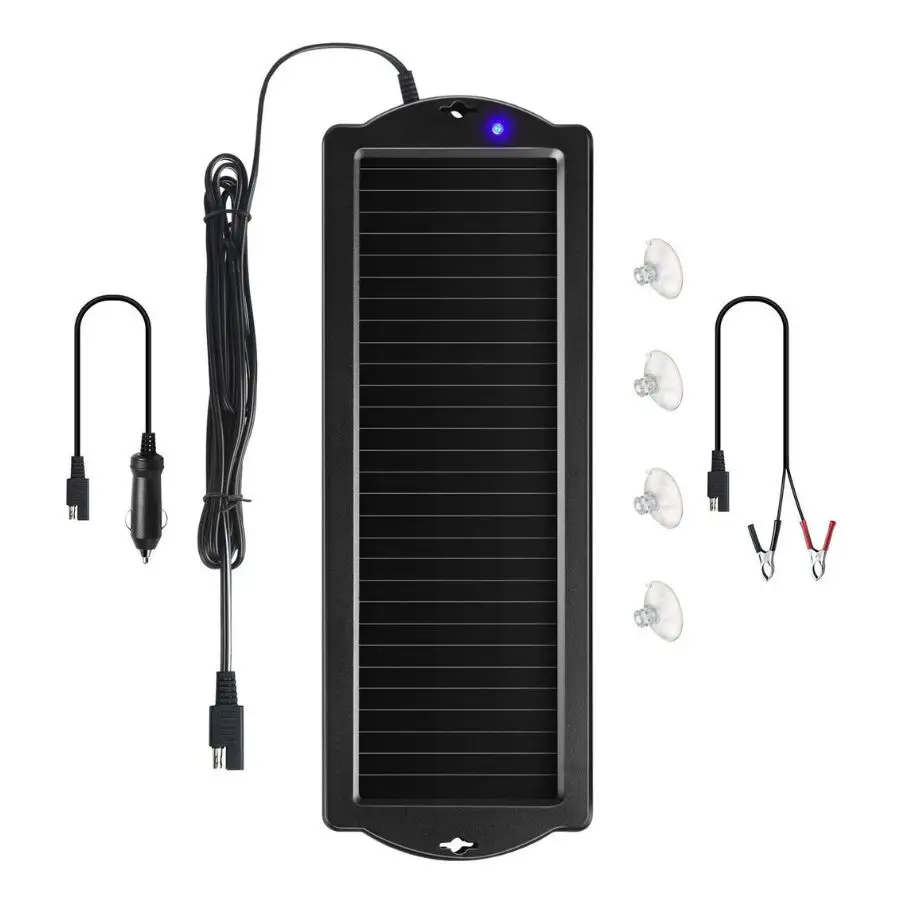
Specifications:
- Type of solar cell: Amorphous
- Wattage: 1.5W
- Voltage: 12V
- Weight: 1.37 lbs
- Dimensions: 0.5 x 13.98 x 5 in
This solar battery maintainer offers you an economical way to keep the battery of your solar-powered boat topped up using the free renewable energy provided by the sun. These solar panels for boats are quite easy to install on the windshield or the dashboard. Suction cups are provided in the kit for this purpose. This can be plugged in using the 12V cigarette lighter socket.
The amorphous solar panels for boats are enclosed in PV glass and ABS plastic casing for efficiency, strength, and durability. The built-in blocking diode prevents reverse charging. It has a blinking LED indicator to tell you that it is charging. The kit also includes two cables with alligator clamps and a cigarette lighter socket.
Pros:
- DIY installation
- Works on cloudy days
- IP44 weatherproof and splashproof
- Blue flashing LED charge indicator
Cons:
- With limited capacity, it can maintain only small batteries
Buying guide for solar panels for boats
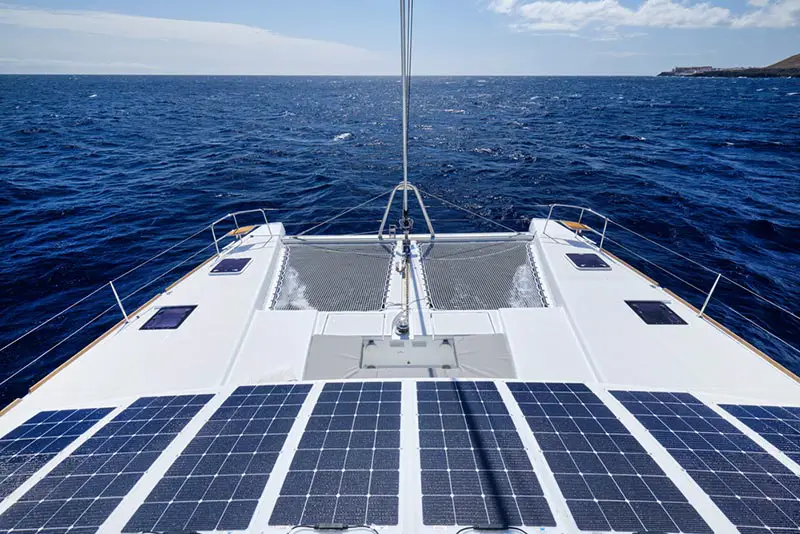
Even though some of the best solar panel for sailboat are listed above, your requirements may be different. You may want to make your own selection. Before going shopping for solar panels for boats, you need to have a good idea about your requirements and things you should look for and pay attention to.
Things to consider when shopping for solar panels for boats
As this is a substantial investment, you should consider it from all angles before making the decision. Here are the most important aspects you should consider.
1) Size or capacity of the panel
The solar panels for boats you buy should be sufficient to meet your energy needs. Or else, it will be a waste of your investment. If the solar panel doesn’t generate enough energy, it will be useless. Moreover, if it can’t recharge the battery fast enough, your battery will drain in no time, leaving you frustrated.
You should pick a solar panel with enough capacity to handle the energy demands of your solar-powered boat.
2) Types of solar panels for boats
All solar panels for boats convert renewable energy from the sun into electricity. But they are not built the same. They differ in their efficiency levels, flexibility, portability, and even in their outer casing and protective covering. Monocrystalline solar panels offer the highest efficiency while thin-film panels are the least efficient. Marine-grade solar panels are flexible for the uneven surface of sailboat roofs besides being lightweight and waterproof.
While some panels come with PVC sheets, others are equipped with tempered glass with UV protective coating for longevity. Some are compact, lightweight, and foldable and come with a well-protecting carry case.
Waterproofing is another aspect to consider as solar panels for boats need to be kept in the open. You need to figure out the best solar panels for boats that you can afford to suit your requirement within your budget.
3) Accessories supplied
Based on your purpose, you either need a solar charge controller or a maintainer to use the power generated by the solar panels for boats. These should have systems in place to prevent damage to the battery from overcharging and draining. It is also ideal if you get the right cables for connection in the kit besides mounting brackets for installation. If they do not come with the panels, you may be forced to spend extra and purchase them additionally.
How does a solar-powered boat work?
It is similar to any other solar-powered installation, such as a car or a golf cart. Solar panels for boats consist of four main components connected together – a solar panel, a solar charge controller, an inverter, and a battery.
The solar panels for boats are designed to convert the sunlight falling on them into electricity. This is used by the solar-powered boat to run its devices.
Charge controller: A solar charge controller is not an essential component of the solar panel system. But without it, there is always the risk of overheating and overcharging the battery. To ensure the longevity of your battery, it is desirable that you have a charge controller.
Inverter: The solar panels for boats generate DC power, which can be used only by select devices. If you want to power devices that work on AC power, you will need an inverter to convert DC into AC supply. The inverter needs to match the capacity of the solar panel.
Installation: If the solar panel is big, you can make use of the professional installation offered by the manufacturer. If this is not feasible, you can always get a local solar installer to do the job for you. However, if the solar panels for boats are smaller and come with a DIY kit, you can manage this yourself.
In the case of higher capacity solar panels for boats, you need to handle the process of buying and installing them step by step. As the first step, you need to understand the voltage requirement of your solar-powered boat. You can do this by checking all the main electrical devices in it. The solar panels for boats should have a voltage higher than your requirement.
Another point to consider is the outer casing of the solar panel. While glass-fronted ones are less expensive, they are not as good as polycarbonate panels in weatherproofing. Then you can also have the choice of foldable and flexible solar panels.
How can you ensure the longevity of solar panels for boats?
Even though solar panels for boats are low maintenance because of the absence of moving parts, they still require some level of maintenance to ensure their efficiency and longevity.
Lifespan
The typical lifespan of solar panels for boats comes in the range of 20 to 30 years. Though maintenance is minimal, it is necessary to keep them clean and clear of obstructions to get the maximum from them. If you buy solar panels for boats from well-known brands, they would come with warranties for workmanship, material, and performance.
It is always better to choose a professional to ensure the proper installation of solar panels for boats. The same is the case when it stops working after the warranty period. This way, you can make sure that the panels stay intact for longer periods.
Solar panels for boats, like any other device, will lose their efficiency as they get older. Though they will continue to generate electricity, it will be less. Moreover, they tend to break down more frequently as they age. It’s up to you to decide when the usefulness of the solar panel is over and it’s time for a replacement.
Periodic maintenance
The periodic maintenance of solar panels involves keeping their surface clean. As solar panels for boats are kept outdoors, dust, dirt, and debris tend to accumulate on their surface, obstructing the sunlight from reaching the panel surface. If there are big trees nearby, their branches may also grow, blocking the sun’s rays.
All you have to do is periodically clean the panel surface and remove the tree branches. Most solar panels for boats are small and lightweight. They may not be able to withstand pressure washing. It’s ideal to clean them with a wet piece of cloth.
Choices in charge controllers for solar-powered boat
As mentioned earlier, though charge controllers are not essential for solar panels for boats, they are desirable as they can help avoid damage to batteries from overcharging. You have three choices in solar charge controllers.
Basic PWM controllers: They make use of pulse width modulation (PWM) to regulate the flow of energy to the battery by reducing the current gradually. It’s switched on and off (pulse width modulated) to maintain the battery at the absorption voltage.
These basic controllers are good enough for pairing with smaller solar panels for boats but not with panels of higher capacity. Their affordability is the attraction.
Mid-range PWM controllers with LCD display: These are a step forward from the basic controllers. They help you keep track of the charge remaining in the battery.
High-end MPPT controllers: These are perfect for high capacity solar panels for boats. They are designed to handle more energy flow from the solar panels. It helps in raising the efficiency of the solar panel system by ensuring the voltage of the solar panels matches that of the battery.
Bottom line
When you’re outdoors and the sun is shining bright, it is imperative to make use of free renewable energy to meet your energy needs. Because of the popularity of solar panel systems in vehicles, you have a variety of choices available in the market. All you need to do is pick the right one to suit your needs.
Besides offering a brief review of the best solar panels for boats, this article also offers a buying guide to make your own selection.

